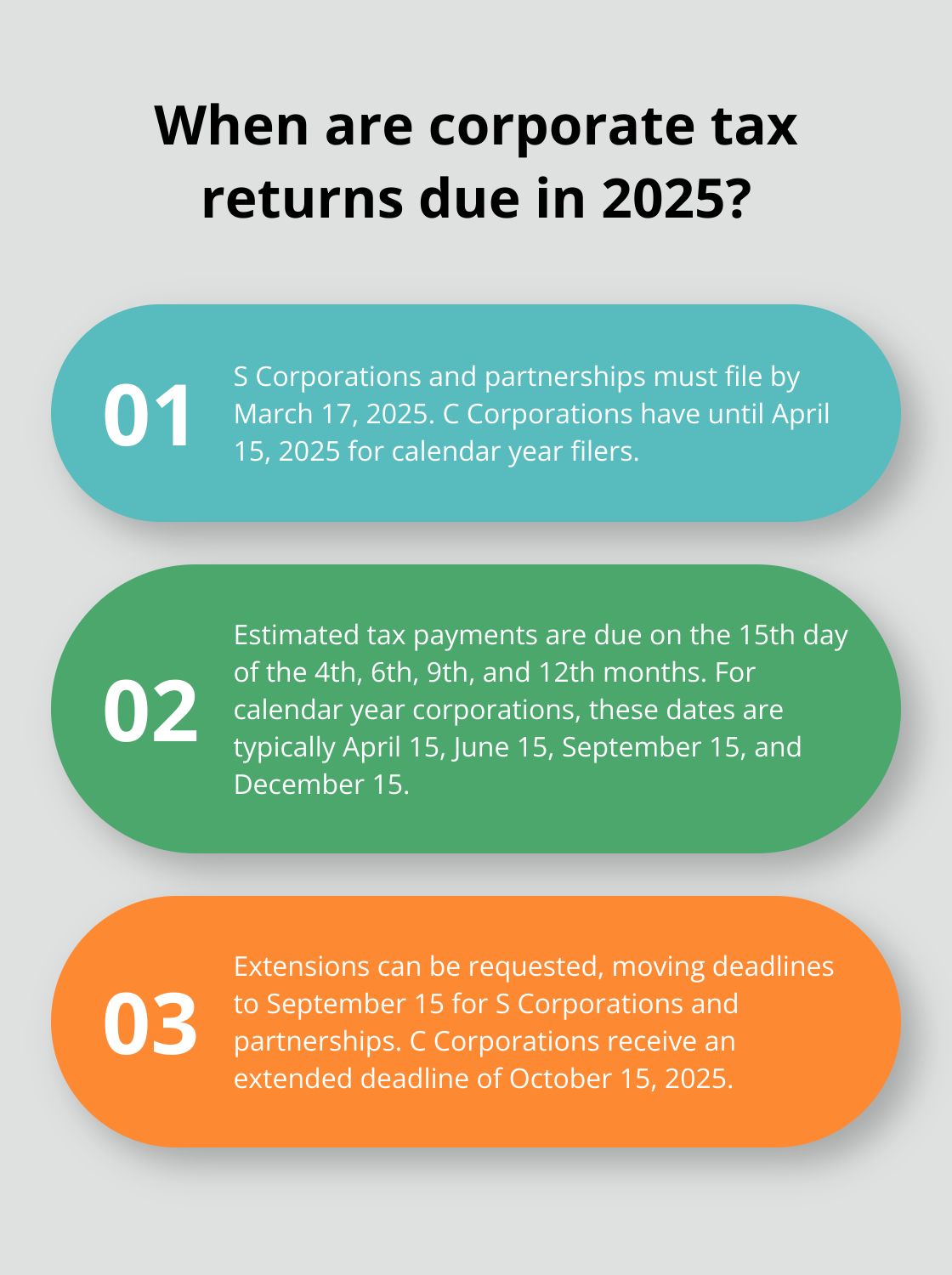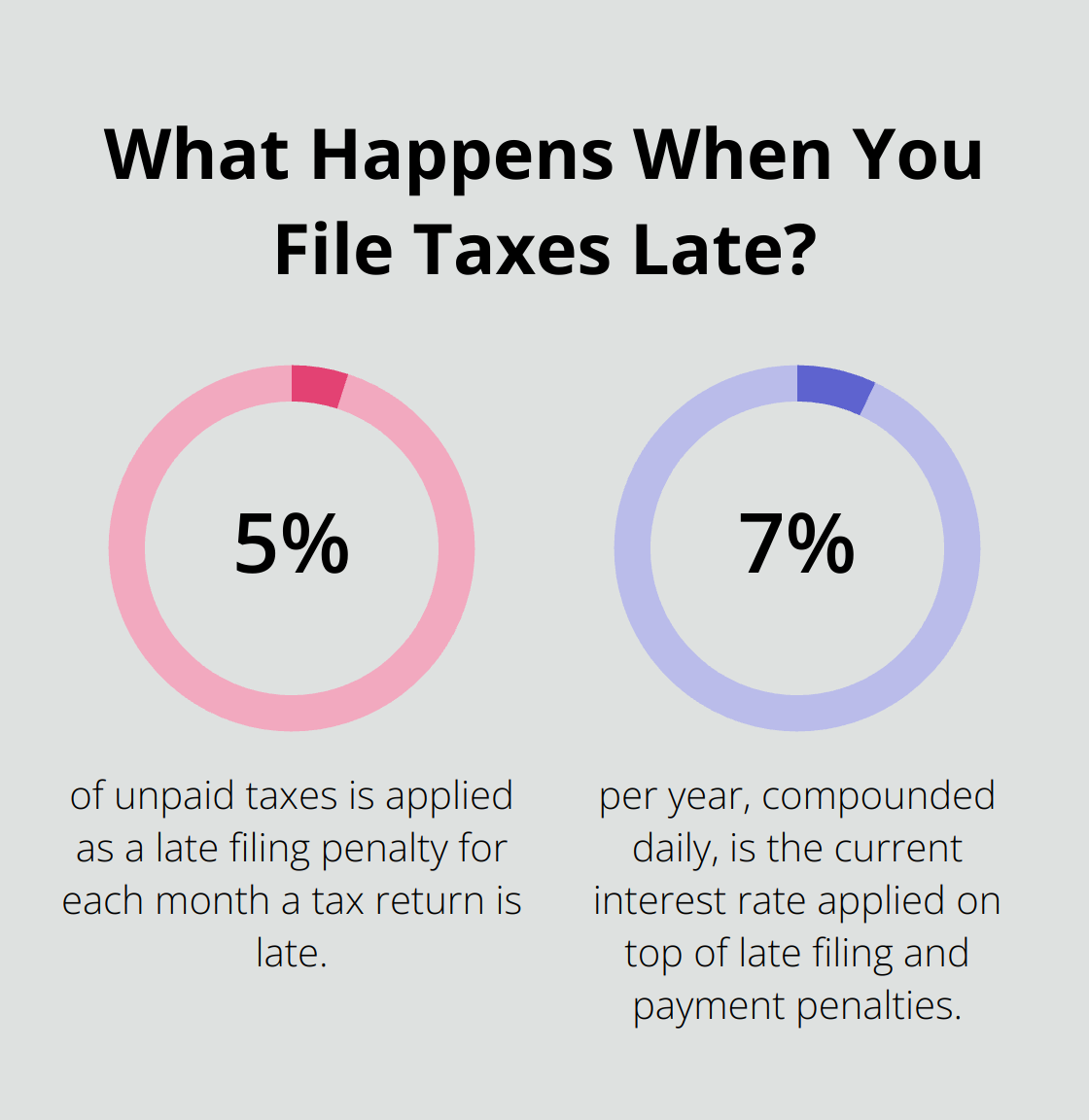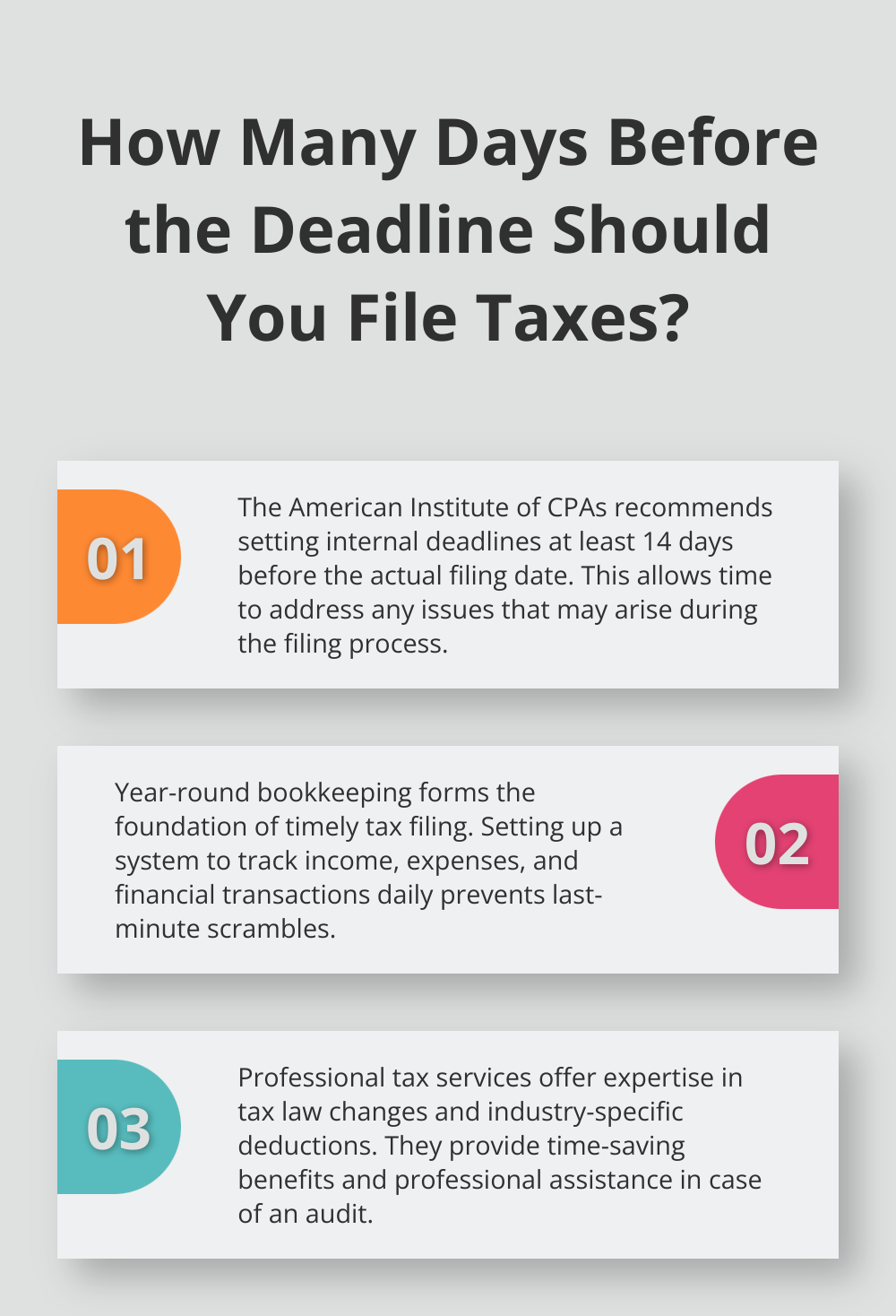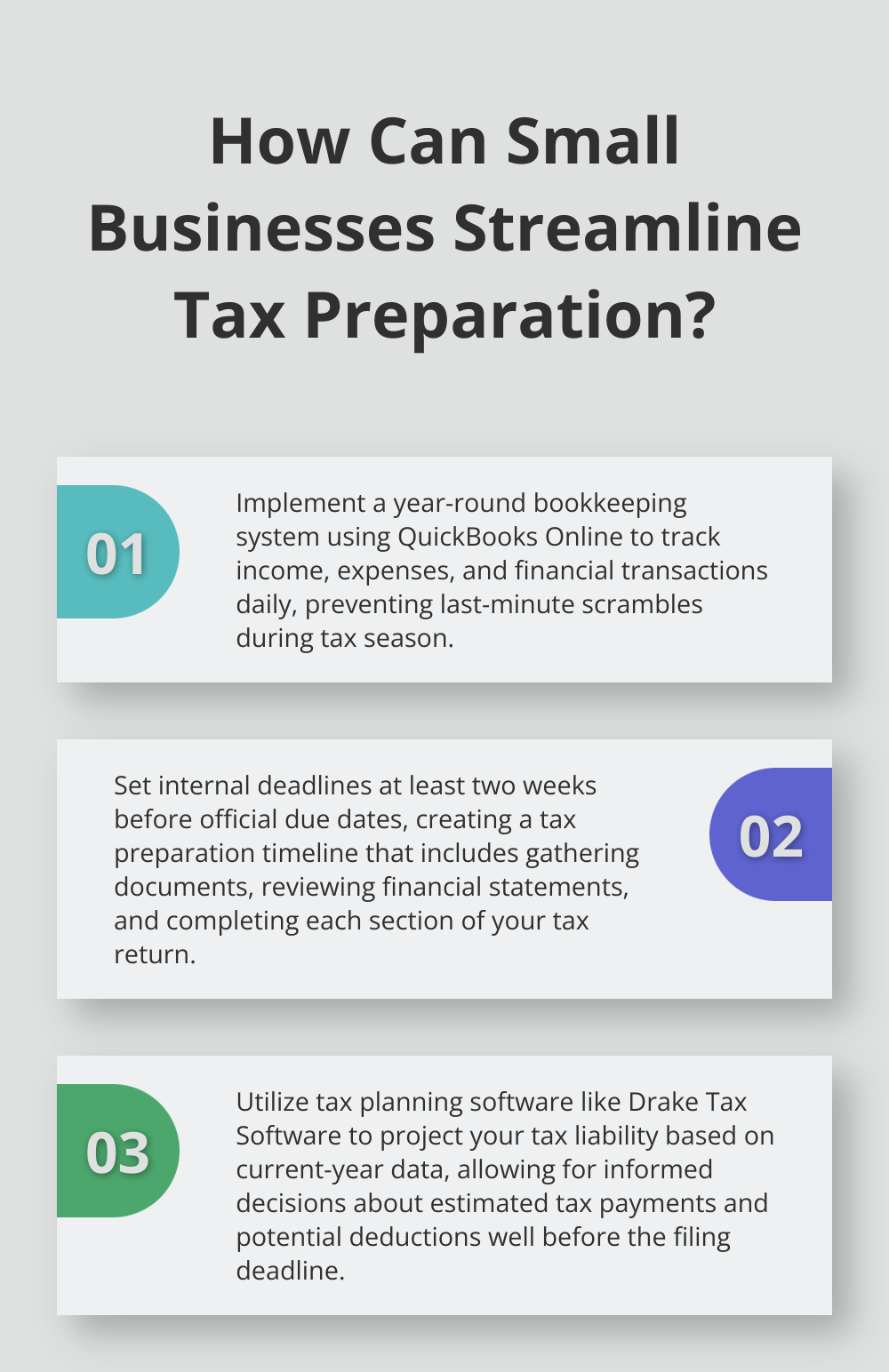Corporate tax filing deadlines can be a maze of dates and requirements. At 7B Bookkeeping & Tax LLC, we understand the stress these deadlines can cause for businesses.
This guide will walk you through the key corp tax filing deadlines and provide strategies to help you stay on track. We’ll also explore the consequences of missing these important dates, so you can avoid costly penalties and maintain your company’s financial health.
When Are Corporate Tax Returns Due?
S Corporations and Partnerships
S Corporations are required to file their annual income tax return by Monday, March 17, 2025, for calendar-year tax filers. This deadline applies to businesses that operate on a calendar year. If your business uses a fiscal year, you must file by the 15th day of the third month following the close of your fiscal year.
C Corporations
C Corporations have a later deadline. They must file Form 1120 by April 15, 2025, for the 2024 tax year if they operate on a calendar year. Fiscal year corporations must file by the 15th day of the fourth month after the end of their fiscal year.
Estimated Tax Payments
Corporations must make estimated tax payments throughout the year. These payments are due on the 15th day of the 4th, 6th, 9th, and 12th months of the tax year. For calendar year corporations, these dates typically fall on April 15, June 15, September 15, and December 15.

If you’re uncertain about your estimated tax obligations, consult with a tax professional. A qualified expert can help you calculate your estimated taxes accurately and set up a payment schedule to avoid penalties.
Extension Deadlines
You can request an extension if you need more time to file. This extends the deadline to September 15, 2025, for S Corporations and partnerships. C Corporations receive an extended deadline of October 15, 2025.
It’s important to note that an extension to file is not an extension to pay. You must still estimate and pay any taxes owed by the original deadline to avoid penalties and interest.
IRS data shows that about 14 million businesses file for extensions each year. While extensions can provide valuable extra time, they also increase the risk of errors due to rushed preparation. Planning ahead and working with a professional can help you avoid this scenario.
These deadlines are federal deadlines. State tax deadlines may differ, so check with your state’s tax authority or consult with a tax professional familiar with your state’s requirements.
Missing tax deadlines can lead to severe consequences (which we’ll explore in the next section). From hefty penalties to increased audit risk, the repercussions of late filing can significantly impact your business’s financial health.
The High Cost of Late Tax Filing
Steep Financial Penalties
The IRS imposes strict penalties for late tax filings, which can significantly impact your business’s bottom line. A late filing penalty of 5% of unpaid taxes applies for each month (or part of a month) that a tax return is late. This penalty starts the day after the tax filing due date and can reach a maximum of 25% of your unpaid taxes. For instance, if you owe $10,000 in taxes and file three months late, you could face a $1,500 penalty.

In addition to the late filing penalty, the IRS charges a late payment penalty of 0.5% of unpaid taxes for each month (or part of a month) the tax remains unpaid. This penalty also caps at 25% of unpaid taxes. Interest (currently at 7% per year, compounded daily) accrues on top of these penalties.
Increased IRS Scrutiny
Late filing doesn’t just cost money; it can put your business under the IRS microscope. The IRS flags late filers for audits more frequently, which can prove time-consuming and stressful. During an audit, the IRS may examine your financial records in detail, potentially uncovering other issues that could lead to additional penalties or back taxes.
Loss of Valuable Tax Benefits
Filing late can result in the forfeiture of certain tax benefits. If you’re eligible for tax credits or deductions, you might lose the opportunity to claim them if you miss the filing deadline. This can significantly increase your tax liability and reduce potential refunds.
Many businesses lose thousands of dollars in potential tax savings due to late filings. In extreme cases, willfully avoiding filing taxes could lead to charges of tax evasion, with fines up to $250,000 and even jail time.
Damage to Business Reputation
Late tax filings can negatively impact your business’s credit rating and reputation. This can make it more difficult to secure loans, attract investors, or win contracts, especially if you’re dealing with government agencies or large corporations that often require proof of tax compliance.
To avoid these costly consequences, you must stay on top of your tax obligations. Working with a professional tax preparer (such as 7B Bookkeeping & Tax LLC) can help ensure you meet all deadlines and maximize your tax benefits. Professional tax services provide comprehensive support to keep your business compliant and financially healthy.
The consequences of late tax filing extend beyond immediate financial penalties. The next section will explore effective strategies to help you meet corporate tax filing deadlines and avoid these costly pitfalls.
How to Meet Corporate Tax Filing Deadlines
Implement Year-Round Bookkeeping
Accurate financial records throughout the year form the foundation of timely tax filing. This helps you avoid the hassles of delayed late tax returns. You can start planning at the beginning of the year by noting your financial records each month.

Set up a system to track income, expenses, and financial transactions daily. This approach prevents a last-minute scramble to gather information when tax season arrives. QuickBooks Online offers real-time financial tracking and reporting, which makes tax preparation more efficient.
Leverage Professional Tax Services
Professional tax services provide expertise in tax law changes and deductions specific to your industry. Professional tax preparation offers expert knowledge, time-saving benefits, and professional assistance in case of an audit.
Utilize Tax Planning Software
Tax planning software helps you stay organized and meet deadlines. These tools often include features like deadline reminders, document storage, and preliminary tax calculations.
Drake Tax Software (used by many professionals) offers a tax planner that projects your tax liability based on current-year data. This allows you to make informed decisions about estimated tax payments and potential deductions well before the filing deadline.
Set Internal Deadlines
Create a tax preparation timeline with internal deadlines set well before official due dates. The American Institute of CPAs recommends setting these deadlines at least two weeks before the actual filing date.
Start by identifying all required forms and their respective due dates. Then, work backward to set deadlines for gathering necessary documents, reviewing financial statements, and completing each section of your tax return.
Choose a Reliable Tax Service Provider
When selecting a tax service provider, consider firms like 7B Accounting & Tax LLC. They offer comprehensive financial services, including expert tax preparation and bookkeeping. With a Chartered Tax Professional and Enrolled Agent on staff, they ensure secure, remote tax preparation and reliable IRS representation.
Their flat-rate bookkeeping service includes account reconciliation and payroll management via QuickBooks Online, which saves time and reduces stress. They also provide QuickBooks setup and training for streamlined financial management.
Try to file as soon as you have all necessary information. This approach provides time to address any issues that may arise during the filing process.
Final Thoughts
Corporate tax filing deadlines require careful attention from businesses of all sizes. Missing these deadlines can result in severe penalties, increased audit risk, and potential loss of valuable tax benefits. Timely filing demonstrates fiscal responsibility and ensures your business remains in good standing with tax authorities.

Proactive tax planning and professional assistance simplify the process of meeting corp tax filing deadlines. Year-round bookkeeping practices, tax planning software, and internal deadlines streamline tax preparation. The complexities of tax law and the potential for costly mistakes make professional guidance a wise investment.
7B Accounting & Tax LLC offers comprehensive financial services to help businesses navigate tax season challenges. Our expert tax preparation, bookkeeping, and financial consulting provide the support needed to meet deadlines and optimize tax strategies. Our team of professionals ensures accurate filings and reliable IRS representation.

